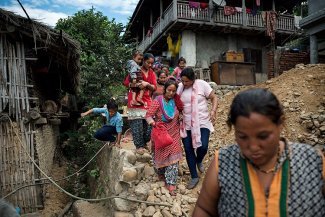As the coronavirus pandemic began racing across the globe, doctors and scientists warned it was especially deadly to the elderly. A few months after the first outbreak, they detected another apparent virus bias: gender. According to data collected by Global Health 50/50, in Italy, men represented 68 per cent of deaths, in China, they accounted for 64 per cent of deaths, and in the UK, the Office for National Statistics revealed that in March, men were twice as likely to die of Covid-19 than women.
The reasons for the disparity remain unknown; suggestions that women smoke and drink less – and have overall healthier lifestyles – have been floated, but aren’t conclusive. But health experts point to another, and more concerning, gendered discrepancy.
"The idea that males worldwide have been disproportionately impacted by covid is true in terms of death rate,” says Kelli Hall, the lead author of a study published in the medical journal The Lancet on how Covid-19 responses are ignoring sexual and reproductive health and justice. “The profound implications for women and girls beyond a higher risk of mortality is being neglected from the global discussion, policy and public.”
Countries tend to push gender issues to the bottom of their lists of priorities during crises, and the coronavirus is no exception. Already, the public health emergency and economic crisis it is bringing in its wake are compounding pre-existing inequalities, forcing women into more precarity, especially in low-resource settings. A lot of it starts with reduced chances at family planning.
DKT International is one of the biggest distributors of contraceptives and providers of safe abortions in the world, working mainly in the Global South. In 2019, the NGO provided 48 million couples with family planning, HIV/AIDS prevention and safe abortion products and services. Chris Purdy, DKT founder and CEO, tells Equal Times that the pandemic has been impacting supply chains: “the production of raw materials, the shipping, the freight, the clearing, the warehousing – every single wrinkle of bringing a product to market is being disrupted.”
In Nigeria, where DKT operates, at the time of writing this article, 12 million condoms and four million packs of birth control pills were stuck in a Lagos port. The shipment was impacted by a months-long backlog due to Covid-19, and condom stocks in Nigeria (which are all imported, according to Purdy) are running out.
The most vulnerable = the hardest hit
As the pandemic drags on, one of Purdy’s chief concerns is that manufacturers will prioritise wealthier markets to make up for their losses. “The markets that are less profitable are the ones that are going to get less attention,” he says.
Women on Web, an NGO that offers tele-abortions (remote services that consist of virtual consultations and mailed-in medical abortion medication), says that their clientele has changed since the pandemic started. The NGO, which famously began as Women on Waves in 1999 providing offshore abortion services to women in countries where the service was restricted or prohibited, has “seen an increase in the help requests we receive” since Covid-19 began, according to a statement sent to Equal Times. “What is interesting about this increase is that we are no longer [just] receiving help requests from countries where abortion is restricted, but also from countries where it’s legal because women are no longer able to access the available services due to lockdowns, childcare, etc.”
Marie Stopes International, an NGO that provides contraception and safe abortions in 37 countries, has modelled several scenarios of disruptions to supply chains and service delivery. In the worst-case scenario (minimal service delivery for the remainder of 2020) a spokesperson for the organisation said that they would be unable to provide services to up to 9.5 million fewer people as a result of coronavirus-related disruptions. It also predicts an additional 1.3 - 3 million unintended pregnancies, 5000-11000 maternal deaths, and between 1.2 - 2.7 unsafe abortions within their country programmes.
This bleak panorama was recently made worse by a decision from Washington. On 29 May, speaking from the White House’s Rose Garden – the very place from which he would threaten to quash protests over the murder of George Floyd with soldiers just a few days later – President Donald Trump announced that the United States was pulling out of the World Health Organization (WHO). It was the next step after suspending funds back in mid-April for failing to, in the president’s estimation, adequately respond to the coronavirus outbreak.
The US is the WHO’s largest single biggest funder, having contributed over US$400 million in 2019.
“At a time when we most need strong international co-operation and co-ordination, withdrawing critical funding from the WHO is a deeply irresponsible and damaging decision,” says Karmen Ivey, Marie Stopes’ global press officer. “It will particularly impact those most affected by Covid: women and girls, poor communities and frontline health workers, who are dependent on the WHO to support national health systems. Without the WHO’s critical work across the world more women and girls will die.”
Like the global gag rule – but worse
Hall, author of The Lancet study, compared the move to the ‘global gag rule’, the Reagan-era policy banning funding for groups that provide abortion services, reinstated and expanded under the Trump administration – “but worse”.
"We know that the global gag rule has dire effects on the abilities of developing countries to provide comprehensive sexual and reproductive health services to the populations who need it most, and in turn, [governments are] not as equipped to prevent maternal morbidity and mortality. A policy that defunds a large portion of money to the WHO has an even broader set of implications."
In Mexico, where, save for two jurisdictions (Mexico City and the state of Oaxaca), abortion is illegal except in cases of rape, activists have been doubling down on their efforts to educate women on family planning and on how to access safe abortions, turning to social media to disseminate information during the lockdown.
Adriana Jiménez, who heads the sexual health sector of the NGO Equidad, tells Equal Times that by the end of May, the number of calls they had received requesting information on legal and safe abortions had tripled since the lockdown began. The number of calls relating to domestic violence, with women asking for help finding shelters, had doubled.
“Despite lockdowns, we know that violence against women and girls doesn’t stop. Nor does the need for access to sexual and reproductive health, like the prevention of unwanted pregnancy, and contraceptives,” says Jiménez.
“Trump is not the only one cutting funds,” she adds. In 2019, Mexico’s President Andrés Manuel López Obrador’s slashed funds for civil society organisations as part of austerity measures. “Women’s NGOs are part of that.” The move was decried by feminist activists, who are particularly concerned about the effect the cuts will have on women’s shelters.
As reports of gender violence soar amidst lockdowns and quarantines, many women have no recourse to assistance. According to the United Nations Population Fund, approximately 15 million additional cases of domestic violence are expected this year due to lockdowns. In Mexico, shelters of Indigenous and Afro-Mexican women are running out of money due to government spending cuts. This puts some of the most vulnerable women in the country, including pregnant women in rural areas who relied on these shelters for care during their pregnancies and to give birth, in life-threatening situations.










